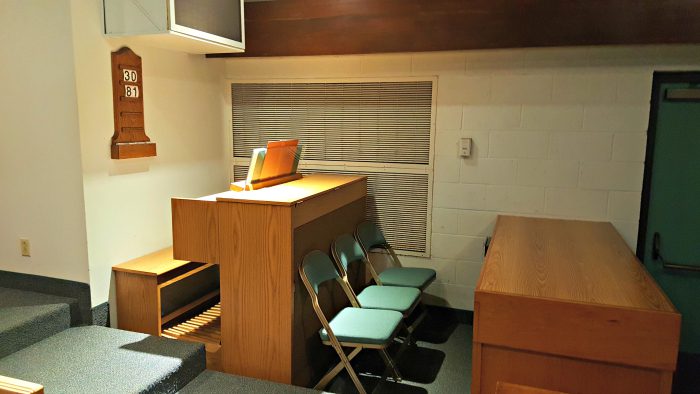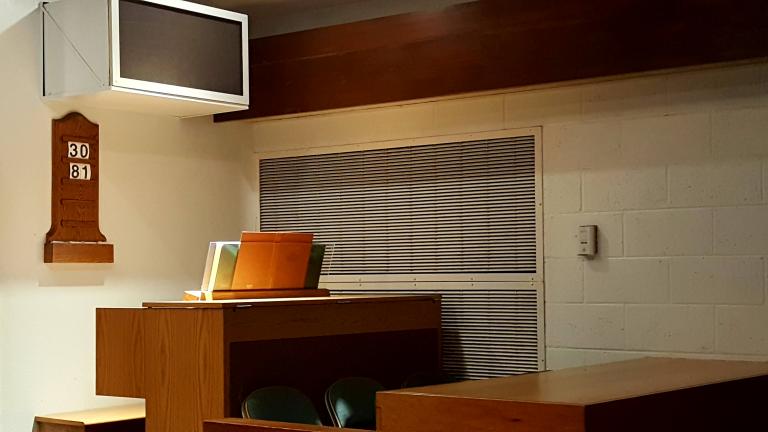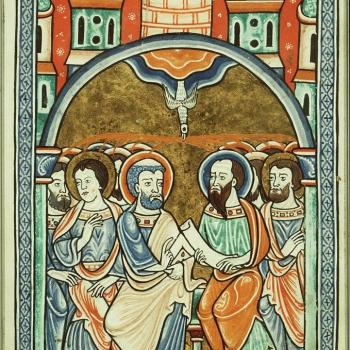I’ve been studying the concept that celestial people are willing to sacrifice themselves for the benefit of others. The obvious example of this is Jesus Christ and His willing atoning sacrifice for the Earth and all life.
A less obvious example is God’s willingness to let us blame Him for our misuse of personal agency. For example, I blame a trial on “God’s plan” for my life when I’m actually facing consequences of my own choices. I feel like God doesn’t mind because trials often turn us to Him. But if we’re repenting and using the Holy Ghost as a guide, then subtle promptings show the difference between choice and His plan. At least that’s been the case in my own life.
This entire mortal probation is God’s plan, of course. And we can use any experience we label good or bad to draw closer to Him and come to know Him.
Taking One For the Team
I’ve prayed to understand this principle more deeply. A lesson showed up in a random way through a calling as…the ward organist.
I’ve had this calling before in other wards, and haven’t felt like I suffered any consequence for it other than the usual humble pie for weekly failings in front of the whole ward. But this time is different and only those who have served in (or near) this capacity in our chapel really understand the sacrifice and suffering.
You see, some person who doesn’t sit and play the organ designed the air conditioning system with vents to flank the organ.
The impact of this horrible design is immediate and severe.

Frigid air designed to cool an entire chapel blasts my entire body as I sit and play music. Within minutes, my fingers and toes freeze. I wear a jacket (because I no longer own a coat in Hawaii) to prevent body and limb frostbite. I wear thick socks to keep some blood circulating in my feet so I can play the pedals. As soon as I’m done with a song, I sit on my fingers attempting to revitalize them before the next physical assault, aka playing a song, begins.
The air blasts my face and hair similar to how it feels when I ride a motorcycle without a helmet. Any attempt at maintaining coiffed hair is decimated within seconds of the air conditioning blast.
My body tries to compensate by sweating to warm me up.
When I rejoin my husband in the pews after the Sacrament, he holds me and attempts to warm me up before the intermediate song. All at once, I am so hot and take off my jacket until I head to the organ again.
So I leave Sacrament meeting cold, sweaty, and disheveled.
I forgot my jacket once. My appendages didn’t unthaw until Relief Society despite all of the heat around me. I haven’t forgotten my jacket again.
This may sound like hyperbole, but I have not overexaggerated any of this description.
And so it goes week after week.
Very few people in our ward have sat at the organ while the air conditioning is on. Many people comment on how ridiculous it is that I’m wearing a coat in a chapel that is so warm. They “never” need a jacket. Most people probably don’t even notice that I’m wearing a jacket or even care for that matter. And they don’t need to.
I didn’t really notice until I had to sub for the organist one day. I’ve played the organ in so many buildings and have never experienced such a thing. Why would I even imagine it?
After that experience, I started carrying socks perpetually in my church bag in case I had to substitute again.
So My Lesson?
In this eternally insignificant way, I’ve agreed to sacrifice my comfort for the good of the ward. Even like I don’t understand others’ sacrifices in their callings, people who haven’t had this same calling can’t comprehend it. And that’s OK.
Because I can’t really comprehend the eternally significant atonement of Jesus Christ, but I’m still grateful for His sacrifice. Sometimes by my actions, I don’t even acknowledge He did suffer for me or even act like I care at all.
And yet the suffering blast
… caused myself, even God, the greatest of all, to tremble because of pain, and to bleed at every pore, and to suffer both body and spirit—and would that I might not drink the bitter cup, and shrink—
Nevertheless, glory be to the Father, and I partook and finished my preparations unto the children of men.
Because He is who He is, Jesus Christ willingly sacrificed Himself for me and you and all who will.
Mortal Examples of Taking One For the Team
Are there mortal examples of people willingly sacrificing themselves for others? Do those they sacrifice for even know or understand someone’s willingness to suffer for them?
In Abinadi’s willingness to declare truth to people who needed truth, he also showed his willingness to die for it. Ultimately, Abinadi died for just one person. Did Abinadi know his impact on Alma would change the course of Nephite society? Alma’s descendant welcomed Jesus Christ to Bountiful and presided over a Zion society—one of the few Zions that have existed on Earth.
Now Abinadi said unto [the king]: I say unto you, I will not recall the words which I have spoken unto you concerning this people, for they are true; and that ye may know of their surety I have suffered myself that I have fallen into your hands. …
And now, when Abinadi had said these words, he fell, having suffered death by fire…having sealed the truth of his words by his death.
If Not, Blot Me Out of Thy Book

I began thinking of this pattern that absolute charity leads to a willingness to sacrifice all for those you serve as I’ve read the wanderings of Moses and the House of Israel in the wilderness.
Moses wanted to bring his people into God’s presence. But they feared and refused the opportunity. When the people sinned, Moses pled for God’s mercy, actually declaring his willingness to be destroyed in the people’s place.
The Psalmist succinctly recorded this salvation, which occurred more than once.
Therefore [God] said that he would destroy them, had not Moses his chosen stood before him in the breach, to turn away his wrath, lest he should destroy them.
I can’t even imagine the intensity of those moments. The books of Moses tell of plagues spawning because of someone’s sin and spreading through the camp immediately. Thousands of people died because of these plagues. Repentance stayed the plagues. Sometimes quick action to kill the sinful perpetrator provided the repentance that stayed the plague. These stories fascinate me.
But nothing captures my attention more than Moses running before God, falling on his face, and saying please don’t kill the people. If you must kill someone, then kill me for them.
Moses said unto the people, Ye have sinned a great sin: and now I will go up unto the Lord; peradventure I shall make an atonement for your sin.
And Moses returned unto the Lord, and said, Oh, this people have sinned a great sin…
Yet now, if thou wilt forgive their sin—; and if not, blot me, I pray thee, out of thy book which thou hast written.
Did they know of his declaration to sacrifice his eternal salvation for theirs?
I cannot comprehend that! Ironically, I’m so concerned about my own eternal progression, I can’t imagine offering it up indiscriminately for others. And, thus, obviously, I need continued lessons from those who have sacrificed so much for me.












